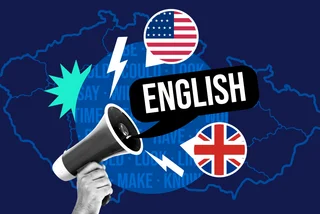Many are fond of Czechia’s beautiful sights and cheap beer, but one local aspect proves to be a tough nut to crack for the 600,000 registered foreigners who live in Czechia (pre-2022): the Czech language.
With the finding that 72 percent of Czechs believe foreigners “should adapt to local customs” as much as possible, this can sometimes lead to difficulties in communication.
Ranked first – for the wrong reasons
In fact, a recent study has ranked Czech as the “most challenging” language in Europe to navigate. Examining 29 different European countries, language app Preply analyzed three main aspects of countries: the number of official languages and accents, the English proficiency score, and the average hourly cost of an online language lesson.
The “26 different spoken dialects and accents” in the country were among the reasons why Czech was the trickiest language to come to grips with. The average cost of an online private lesson was also the most expensive, at a surprisingly high 73 euros (CZK 1,774) per hour.
Czech is a western Slavic language, and, like other languages in its family, it is known for its complicated grammar, tricky pronunciation – such as its unique “ř” sound – and numerous declensions.
The country also ranked 22nd out of 29 countries in its English proficiency ranking.
CZECHS' ENGLISH STRUGGLES
- In Education First’s 2021 English Proficiency Index, Czechia was ranked in the bottom half of European countries for the English proficiency of the locals.
- Just 45 percent of the population can speak some level of English.
- Over 30 percent of Czechs could "not even speak a bit of English," according to a 2020 study.
- About 1 in 3 Czechs do not speak any foreign language.
- Just seven percent of Czechs can communicate in English "at an advanced level."
Poor levels of English (and other foreign languages) is problematic not only for expats, but also for Czechs. Data from Grafton Recruitment showed in 2021 that a language other than Czech is required in 4 out of 10 job offers in the Czech Republic.
What about the rest of Europe?
Other countries with particularly poor English-speaking skills in Preply’s index are France, Spain, and Italy (ranked 23rd, 24th, and 25th respectively).
How's your Czech?
The Preply study found that Romania was overall the “least challenging to navigate” for expats, owing to its low amount of accents and dialects, cheap language lessons, and relatively high English proficiency. Ireland was ranked second overall, with Portugal and Serbia in joint third position.
The Netherlands, Austria, and Denmark were in the top five highest-ranked countries for English proficiency, according to Preply. This is corroborated by results from the English Proficiency Index, which ranked the Netherlands as the best (non-native) English-speaking country.
Turkey, Ukraine, and Serbia had the cheapest local-language lessons. Finland, Norway, and Sweden had among the most-expensive local language lessons, which will not come as a surprise, given Scandinavian countries’ traditionally high consumer prices.
The unfortunate combination of poor English-speaking proficiency and a difficult language can make daily life tricky for expats – something that may well prompt people to teach themselves Czech in future.












 Reading time: 2 minutes
Reading time: 2 minutes 

































